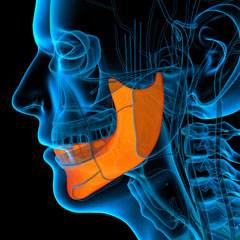Jaw Pain
Temporomandibular joint dysfunction (TMJ)
 Synovial hinge joint joining the mandible (jaw) with the temporal bone (scull). A cartilage disc (meniscus) divides the joint. Two muscles temporalis and masseter allow the jaw to move forwards, sideways and open and close the mouth.
Synovial hinge joint joining the mandible (jaw) with the temporal bone (scull). A cartilage disc (meniscus) divides the joint. Two muscles temporalis and masseter allow the jaw to move forwards, sideways and open and close the mouth.
When injured or damaged it leads to temporomandibular joint syndrome. This injury occurs most frequently in females (unilateral) in the age group of 20 – 45 years of age.
The cause of injury is thought to be related to clenching or grinding teeth from stress, excessive chewing of gum or biting on hard food. Dental work involving wisdom extraction, or sustaining the mouth open for prolonged periods can also lead to TMJ syndrome. Arthritis and a traumatic blow in contact sports can lead to subluxation and TMJ pain. Poor posture can be a contributing factor.
The patient will complain of insidious onset of facial or jaw pain often around the “ear region”. Signs and symptoms include stiffness in the jaw region, tender facial muscles and spasm on palpation. Audible clicking and locking may occur on more severe cases. X-rays are almost always normal especially in the young age group.
Physiotherapy treatment of TMJ syndrome at our Bondi Junction physiotherapy clinic.
Physiotherapy treatment involves deep tissue (trigger point and myofascial) massage, gentle passive mobilization techniques, acupuncture, ultrasound and electrotherapy modalities. The physiotherapist will teach the patient exercises to strengthen and stretch the jaw muscles. Relaxation and posture correction exercises will also be taught. At our Bondi Junction physiotherapy practice we often work closely with leading dentists to prescribe a dental bite plate or nonsteroidal anti inflammatories (NSAID).
The prognosis is very good with recovery usually within four weeks of treatment.





